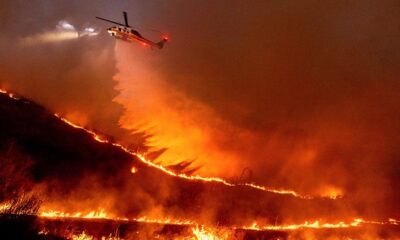Politics
Newsom seeks to restrict students' cellphone use in schools: 'Harming the mental health of our youth'
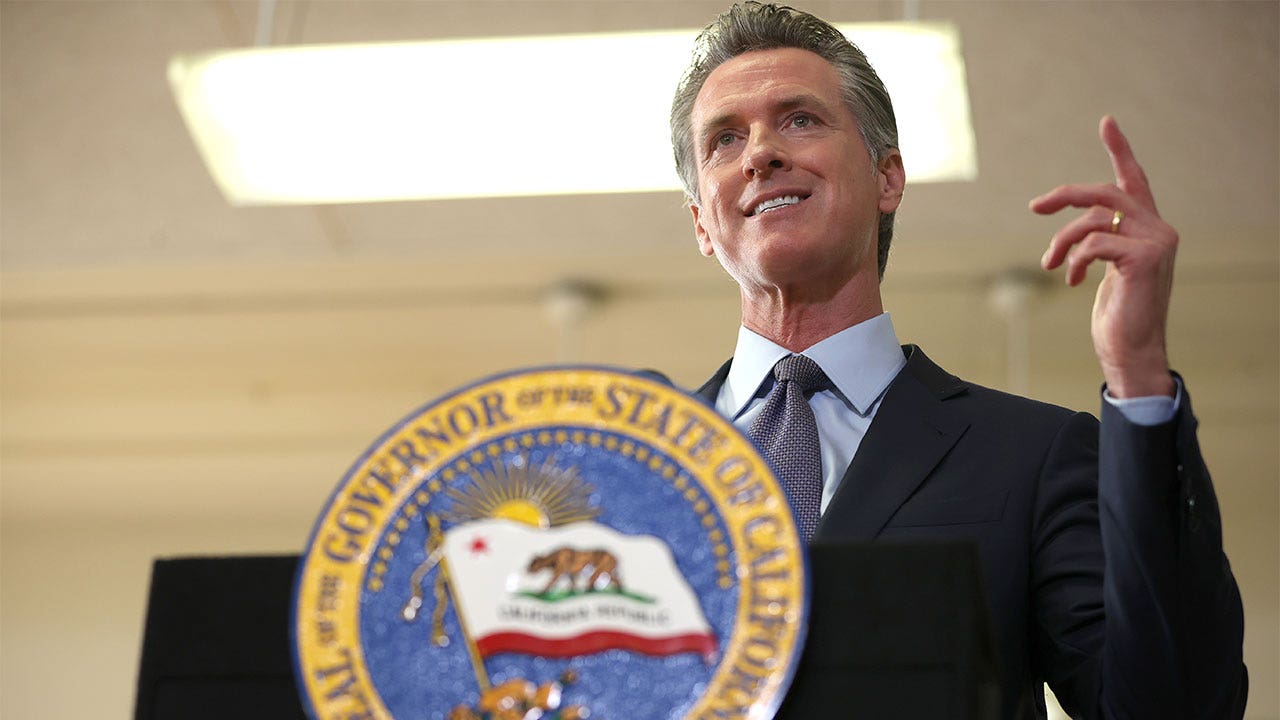
California Gov. Gavin Newsom, a Democrat, announced Tuesday his pledge to restrict students’ smartphone use during the school day, pointing to statements from the Biden administration that social media harms the mental health of children.
The decision comes after U.S. Surgeon General Vivek Murthy urged Congress to require warning labels on social media platforms about their impact on young people, similar to the warning labels on cigarettes and alcohol about their impacts on a person’s health, according to POLITICO, which first reported Newsom’s announcement.
Newsom and his wife, Jennifer Siebel Newsom, have warned for years about the harm of social media to children, saying tech companies have been blocking efforts to protect young people.
Last year, Newsom called on NetChoice to drop a lawsuit against the children’s online safety law, the Age-Appropriate Design Code Act, that he signed in 2022. NetChoice, whose members include tech giants like Meta, Amazon and Google, is a trade association that advocates for free expression and free enterprise on the internet.
STATE LAWMAKERS PUSH FOR BAN ON PHONES IN SCHOOL
California Gov. Gavin Newsom announced Tuesday his pledge to restrict students’ smartphone use during the school day. (Justin Sullivan/Getty Images)
The governor said Tuesday he plans to build on a law he signed in 2019 that gave school districts the power to limit or ban students’ use of smartphones during school hours. He said he would work with his Democratic-controlled Legislature during the current session to pass a measure to restrict smartphone use in schools.
“As the Surgeon General affirmed, social media is harming the mental health of our youth,” Newsom said in a statement. “Building on legislation I signed in 2019, I look forward to working with the Legislature to restrict the use of smartphones during the school day. When children and teens are in school, they should be focused on their studies — not their screens.”
The California School Boards Association said school districts should be making decisions on whether to regulate smartphone use in schools, rather than the state.
“We support legislation which empowers school leaders to make policy decisions at a local level that reflect their community’s concerns and what’s necessary to support their students,” California School Boards Association spokesperson Troy Flint told The Associated Press.
SOCIAL PSYCHOLOGIST URGES PARENTS TO KEEP SMARTPHONES AWAY FROM KIDS TO ‘PROTECT’ THEIR MENTAL HEALTH
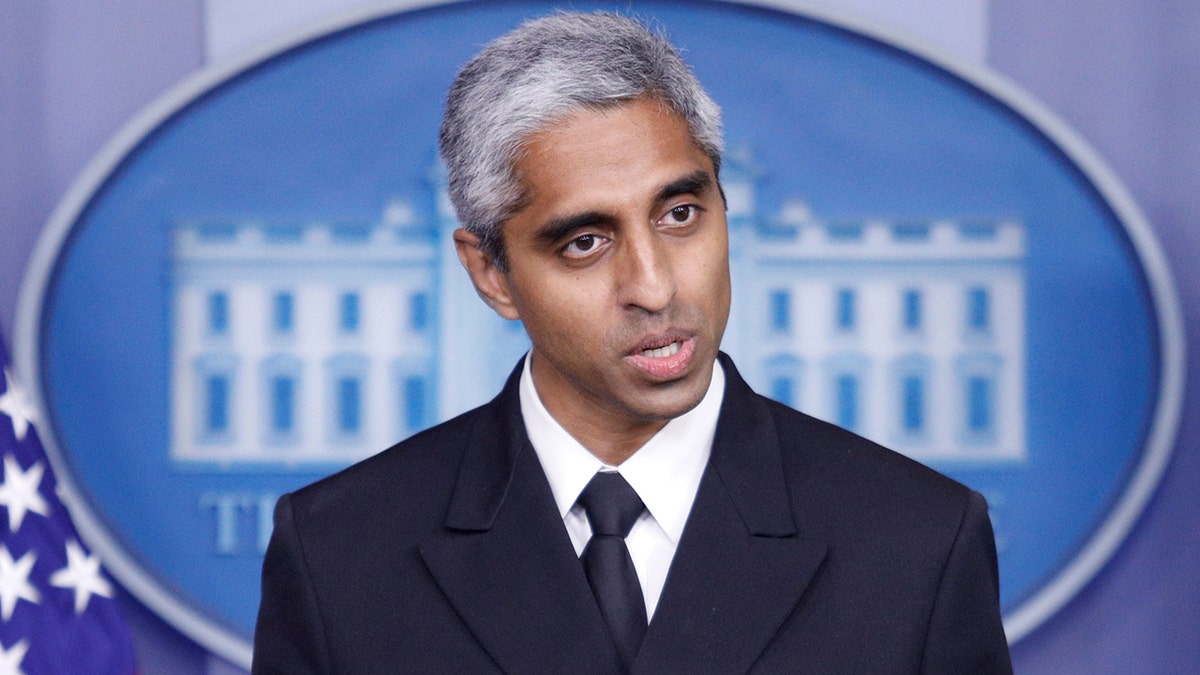
U.S. Surgeon General Vivek Murthy urged Congress to require warning labels on social media platforms about their impact on children. (REUTERS/Tom Brenner)
The Los Angeles Unified School District board voted Tuesday for the district to establish policies prohibiting students’ smartphone use during the school day, with some exceptions. Board Member Nick Melvoin noted how “students are glued to their cell phones, not unlike adults.”
“When I talk to teachers and students and parents and principals, I also hear the same, which is that more and more time is being spent on policing student phone use,” he said at the meeting. “There’s not coherent enforcement, and they’re looking for some support from the board and from the district.”
Newsom’s announcement is noteworthy as California’s Silicon Valley is where many tech companies are located.
The decision also puts the California governor on the same side of the debate as Florida Republican Gov. Ron DeSantis, who earlier this year signed one of the most restrictive bans in the country on children’s social media use.
In recent years, a California proposal to fine social media platforms for addicting children has failed to become law. However, Democrat state Sen. Nancy Skinner’s bill to ban platforms from providing addictive feeds to children passed the state Senate in May.
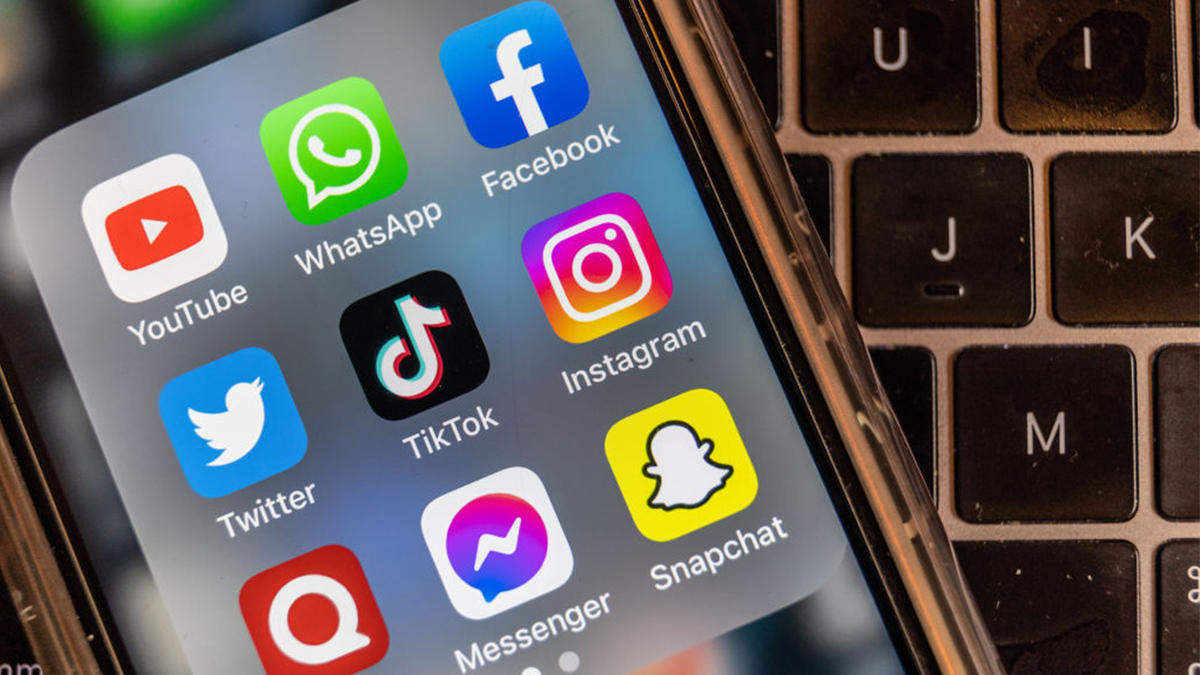
Gov. Newsom said he plans to build on a law he signed in 2019 that gave school districts the power to limit or ban students’ use of smartphones during school. (Getty Images)
“A warning label is important, but we also need to provide parents with tools to protect their kids from preventable harms,” Skinner told POLITICO, saying her bill would complement Murthy’s proposal.
State Sen. Henry Stern, a Democrat, introduced a bill earlier this year to expand school districts’ power to restrict social media use for students during school. He said he would be open to pulling his bill, which already passed the Senate, if Newsom and the Legislature can find a better alternative.
“It’s just too hard for every teacher, every school, or every parent to have to figure this out on their own,” Stern told The Associated Press. “There’s some times where government just has to step in and make some bigger rules of the road.”
The Associated Press contributed to this report.

Politics
Video: Pete Hegseth’s Confirmation Hearing

In a hearing that stretched more than four hours, Democrats pressed Pete Hegseth, President-elect Donald J. Trump’s pick for defense secretary, on numerous allegations of misconduct, his views about women in combat and his ability to lead the department. Eric Schmitt, national security correspondent for The New York Times, explains a moment that stood out in the hearing.
Politics
Trump Energy Sec pick to share American 'energy dominance' vision at confirmation hearing: 'Agent for change'

Chris Wright, President-elect Trump’s nominee to lead the U.S. Department of Energy, is planning to tell senators in charge of his confirmation that he will focus on restoring American “energy dominance” at home and abroad.
Wright, a fossil fuel executive who in the past has been critical of the media blaming climate change for repeated wildfires, is expected to deliver his opening statement before the Senate Energy and Natural Resources Committee on Wednesday morning. Fox News Digital obtained a copy of the statement in advance ahead of the hearing scheduled to start at 10 a.m. ET.
“I am humbled by the great responsibility this position holds,” Wright is expected to say in his opening statement. “America has a historic opportunity to secure our energy systems, deliver leadership in scientific and technological innovation, steward our weapons stockpiles, and meet Cold War legacy waste commitments.”
Describing himself as a “science geek, turned tech nerd, turned lifelong energy entrepreneur,” Wright will tell the committee how his “fascination with energy started at a young age in Denver, Colorado.” His opening statement discusses how he enrolled at MIT “specifically to work on fusion energy” and later started graduate school at the University of California at Berkeley where he worked “on solar energy as well as power electronics.”
TRUMP EYES AN END TO NEW WINDMILL PRODUCTION UNDER SECOND TERM, SAYS THEY ARE ‘DRIVING THE WHALES CRAZY’
Liberty Oilfield Services Inc. CEO Chris Wright laughs as he celebrates the companies IPO on the floor of the New York Stock Exchange, January 12, 2018. (Reuters)
“Energy is the essential agent of change that enables everything that we do. A low energy society is poor. A highly energized society can bring health, wealth, and opportunity for all,” Wright will say. “The stated mission of the company that I founded – Liberty Energy – is to better human lives through energy. Liberty works directly in oil, natural gas, next generation geothermal and has partnerships in next-generation nuclear energy and new battery technology.”
“Energy has been a lifelong passion of mine, and I have never been shy about that fact,” Wright plans to tell the committee. “Then again, I have never been shy about much. President Trump shares my passion for energy and, if confirmed, I will work tirelessly to implement his bold agenda as an unabashed steward for all sources of affordable, reliable and secure American energy.”
On Tuesday, committee Democrats led by Sen. Martin Heinrich of New Mexico called for Wright’s confirmation hearing to be delayed by at least a week, citing how they had not yet received “the standard financial disclosure report, ethics agreement, or the opinions from the designated agency ethics officer and the Office of Government Ethics stating that the nominee is in compliance with the ethics laws.”
Chairman Mike Lee, R-Utah, has already pushed back the confirmation hearing for Doug Burgum, Trump’s pick for interior secretary, by two days until Thursday due to an OGE paperwork delay, but Wright’s remained on the schedule Wednesday.
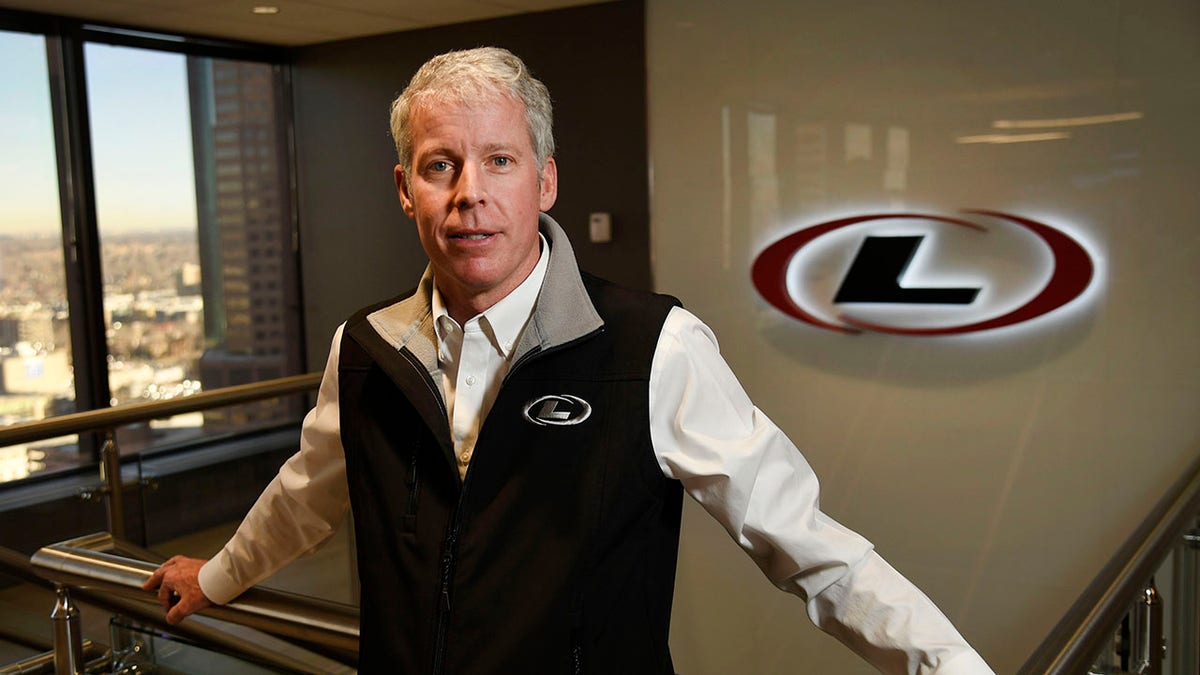
Liberty Oilfield Services CEO Chris Wright at Liberty January 17, 2018. (Andy Cross/The Denver Post via Getty Images)
If approved as secretary, Wright would manage energy policy and production in the United States, as well as the nation’s nuclear weapon stockpile. He would also work with Burgum on the National Energy Council, where they would develop Trump’s energy dominance policy involving increased production of U.S. oil and gas.
Wright has indicated that he plans to resign as CEO and chairman of his fracking company, Liberty Energy, if approved.
DEMS BLAME LA FIRE ON ‘CLIMATE CHANGE’ DESPITE CITY CUTTING FIRE DEPARTMENT BUDGET
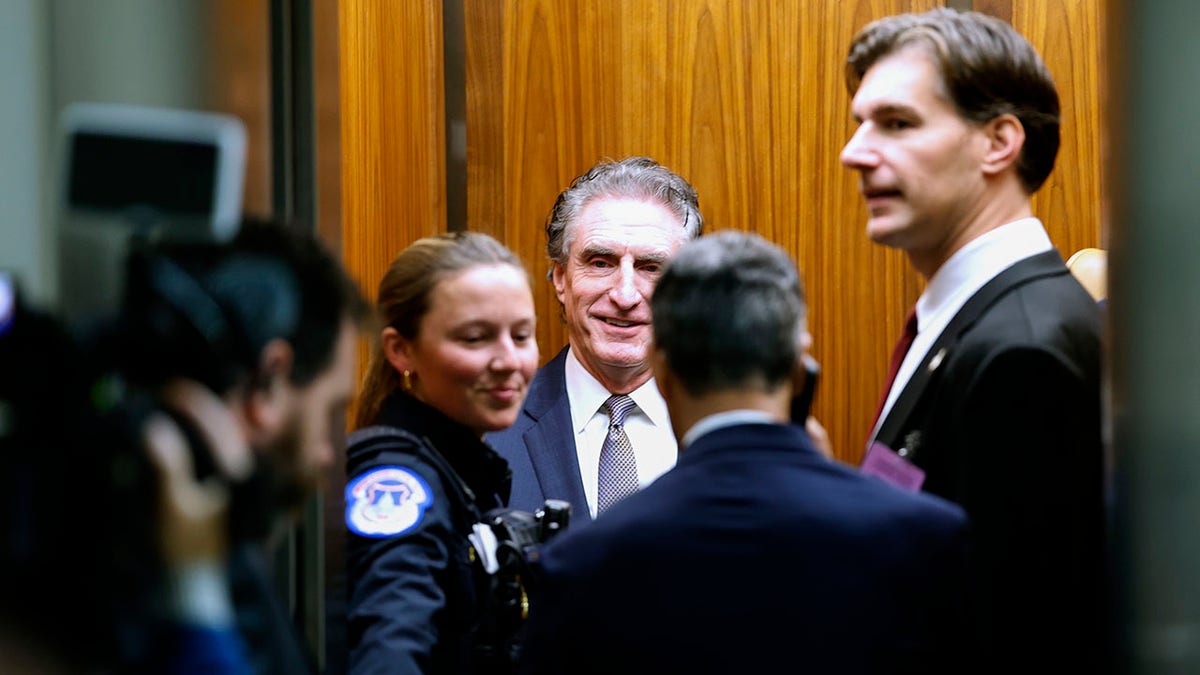
Trump’s nominee to be Secretary of the Interior Doug Burgum rides an elevator in the Dirksen Senate Office Building on Dec. 10, 2024 in Washington, DC. (Anna Moneymaker/Getty Images)
In his opening statement, Wright identifies three “immediate” tasks that he would focus his attention on if confirmed.
“The first is to unleash American energy at home and abroad to restore energy dominance,” Wright will say. “The security of our nation begins with energy. Previous administrations have viewed energy as a liability instead of the immense national asset that it is. To compete globally, we must expand energy production, including commercial nuclear and liquified natural gas, and cut the cost of energy.”
“Second, we must lead the world in innovation and technology breakthroughs,” the statement continues. “Throughout my lifetime, technology and innovation have immeasurably enhanced the human condition. We must protect and accelerate the work of the Department’s national laboratory network to secure America’s competitive edge and its security. I commit to working with Congress on the important missions of the national laboratories.”
“Third, we must build things in America again and remove barriers to progress,” Wright will say. “Federal policies today make it too easy to stop projects and very hard to start and complete projects. This makes energy more expensive and less reliable. President Trump is committed to lowering energy costs and to do so, we must prioritize cutting red tape, enabling private sector investments, and building the infrastructure we need to make energy more affordable for families and businesses.”
Politics
Column: He lost everything in a wildfire. Here's one city councilman's practical advice

SANTA ROSA, Calif. — Jeff Okrepkie wants to make one thing perfectly clear.
Yes, his home burned to the ground after he fled a galloping wall of flames with his wife, their toddler, two dogs and the few items they managed to cram into their cars. But no, Okrepkie insisted, he is not a fire victim.
“I’m a survivor,” he said. “It seems kind of ticky-tacky, but it helps with my mental state to think of myself that way … I survived something that many people haven’t.”
Okrepkie and his wife lost their home and virtually everything they owned in the 2017 Tubbs fire, which turned a wide swath of the Wine Country — including Santa Rosa’s middle-class Coffey Park neighborhood — into a heap of cinder and ash. At the time, it was the most destructive wildfire in California history. Soon, it may rank a mere third, with the still-blazing Los Angeles County inferno topping the list.
Okrepkie, 45, a commercial real estate agent, was displaced through ill fortune. He was elected years later to the Santa Rosa City Council by popular vote. He became an advocate for wildfire survivors, their champion and a clearinghouse of recovery tips by choice and his lived experience.
“How can you have all this information and not share it?” he said during a conversation this week a few blocks from City Hall and a short drive from the subdivision where he returned nearly 2½ years after fire chased him out. “It’s almost seems selfish not to.”
The October weekend that forever changed Okrepkie’s life began in what now seems like blessed normalcy.
He and his wife, Stephanie, attended a wedding on Saturday, a welcome bit of alone time in adult company. Their son was nearly 2 years old and had lately “started scaling the walls,” so Sunday was spent converting his crib into “a big-boy bed.” After it was made up, Okrelie took a picture because they were all so excited.
The rest transpired in a flash.
Reports of a fire breaking out in Napa, 40 miles away. His wife nodding off in front of the TV news. Okrepkie falling asleep. His sister calling and waking him with word of another fire, in Calistoga, 16 miles distant and spreading on powerful winds.
Not much later, the flames leapt Highway 101 and its six lanes and bore down on Coffey Park. Stephanie Okrepkie drove away with her son, the family’s black Lab mix and their Cavalier King Charles Spaniel. Jeff stayed behind, grabbing what he could, until a giant ember landed at his feet, spitting sparks. He took off.

Santa Rosa City Councilman Jeff Okrepkie
(Mark Z. Barabak)
He dispenses his wildfire wisdom in two parts, before and after disaster strikes.
Okrepkie suggested starting with a list of things to grab before you’re forced to go. Figure out what you can get your hands on in five minutes or less and start there, beginning with “the things that are crucial to your life” — passports, birth certificates, marriage certificates, insurance policies, wills, trusts. Expand the list to items you can conceivably gather in 10, 15 and 30 minutes.
Focus, Okrepkie said, on things that are irreplaceable — “an urn with your parents remains, wedding rings” — or that have sentimental value. Clothes, shoes, underwear, pet food; those types of things can be purchased later.
Okrepkie particularly regrets leaving behind a photo of his grandparents, which his late grandmother carried with her everywhere. His wife lost the military fatigues her father wore when he was killed in Iraq, though the couple recovered his dog tags and “challenge coin.”
If you lose your home, Okrepkie went on, don’t wait to find temporary housing. “As soon as you get stabilized somewhere,” he advised, “start calling apartments.” And if it’s unfurnished, make do with used or donated items. “When you get back into your house,” Okrepke said, “that’s when you start spending on the dining room table … that looks nice in your home.”
Beyond that, he counseled patience.
Take as much time as you need to catalog your losses for insurance purposes. If you can collect, say, up to $700,000 and devote 10 hours to compiling a thorough list, that works out to $70,000-an-hour. “That’s a pretty well-paying job,” Okrepkie said. “Think of it that way.”
Also, he said, carefully document every interaction with your insurance company. You’re likely to deal with a number of adjusters, some of whom will move on before your claim is settled. It’s important to have written proof of what was said or promised, so you don’t have to start each time with someone new.
When it comes to rebuilding — if that’s your plan — don’t hurry. Yes, Okrepkie said, there’s an understandable urge to return home as quickly as possible. But he warned against making decisions in haste — in part because rules and regulations can change, affecting what and how you’re able to rebuild. “If you’re rushing, you could be doing something to fit into a box that all of a sudden just became bigger three weeks later.”
He was glad he purchased his new home from a “mass builder” — a developer that goes through the permitting and legal process, then offers buyers a range of floor plans and options — rather than going it alone with an individual architect and builder.
“Most people have never built a house,” Okrepkie said. “They just bought a house that already exists. And so they don’t know what goes together” — carpets, countertops, cabinets, tiles and on. “Whereas these guys were like, ‘Yep, we have this and this and this and this and this.’ It’s a lot easier to comprehend when you have limited choices.”
Through it all, Okrepkie said, building and nurturing a sense of community was vital.
“I can sit here and tell you my entire fire story,” he said over lunch at a cantina in downtown Santa Rosa, “and you’ll empathize with it.” But even the most caring and compassionate person can’t relate “in the same way as someone who’s going through what you’re going though.”
A friend started a gathering that jokingly came to be called “Whine Wednesdays,” where survivors got together — at first on camping chairs set amid the ruins — to drink beer and wine “and just talk to each other,” Okrepkie said. “Not bitching and complaining. Just having conversations.”
His activism on behalf of the burned-out neighborhood led to a seat on the city Planning Commission, which in turn led to Okrepkie’s election in 2022 to the Santa Rosa City Council.
As someone with experience on both sides of disaster — as a wildfire survivor as well as a government official dealing with its aftermath — he offered several suggestions for those in public office.
“Be careful with your messaging, because people can take things very personally,” Okrepkie said. “Don’t call people homeless … We have a home. It burnt.”
Be patient. Very patient. Even as months and years pass and the initial trauma has faded, you’re facing people still grappling with perhaps the worst experience of their life. “Be careful about being too dismissive,” Okrepie said, or coming across as unfeeling.
Don’t be afraid to act boldly if your action can hasten the recovery, he continued. “With electeds there’s always a fear of, ‘Am I going to piss off too many people?’ I don’t think there’s a more altruistic thing you can do than put your neck on the line for people that lost everything.”
Not least, don’t treat survivors as though they’re seeking anything more than they had before.
“We’re not asking to build mansions,” Okrepkie said over his taco salad. “If you have a car you really like and someone hits it, you’re not going to be like, ‘I want a Maserati.’ Just give me what I had … I’m not trying to game the system. There always bad apples that will try to. But most are good people in a crap situation.”
It’s pretty straightforward, he suggested. Be caring. Be kind.
-

 Health1 week ago
Health1 week agoOzempic ‘microdosing’ is the new weight-loss trend: Should you try it?
-
/cdn.vox-cdn.com/uploads/chorus_asset/file/25822586/STK169_ZUCKERBERG_MAGA_STKS491_CVIRGINIA_A.jpg)
/cdn.vox-cdn.com/uploads/chorus_asset/file/25822586/STK169_ZUCKERBERG_MAGA_STKS491_CVIRGINIA_A.jpg) Technology6 days ago
Technology6 days agoMeta is highlighting a splintering global approach to online speech
-

 Science4 days ago
Science4 days agoMetro will offer free rides in L.A. through Sunday due to fires
-
/cdn.vox-cdn.com/uploads/chorus_asset/file/25821992/videoframe_720397.png)
/cdn.vox-cdn.com/uploads/chorus_asset/file/25821992/videoframe_720397.png) Technology1 week ago
Technology1 week agoLas Vegas police release ChatGPT logs from the suspect in the Cybertruck explosion
-

 Movie Reviews1 week ago
Movie Reviews1 week ago‘How to Make Millions Before Grandma Dies’ Review: Thai Oscar Entry Is a Disarmingly Sentimental Tear-Jerker
-

 Health1 week ago
Health1 week agoMichael J. Fox honored with Presidential Medal of Freedom for Parkinson’s research efforts
-

 Movie Reviews1 week ago
Movie Reviews1 week agoMovie Review: Millennials try to buy-in or opt-out of the “American Meltdown”
-

 News1 week ago
News1 week agoPhotos: Pacific Palisades Wildfire Engulfs Homes in an L.A. Neighborhood




